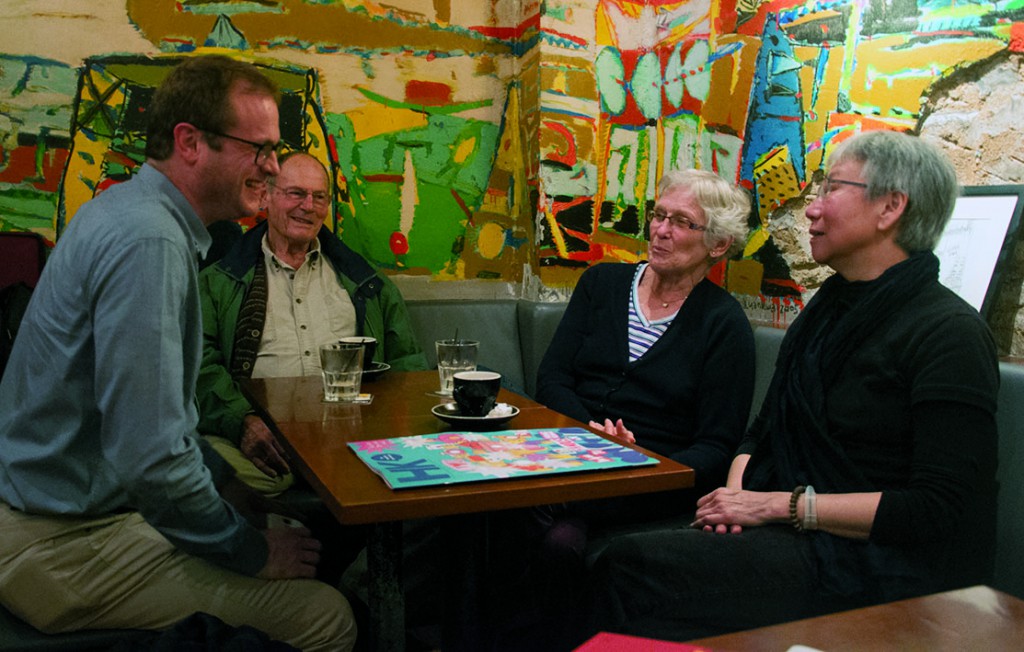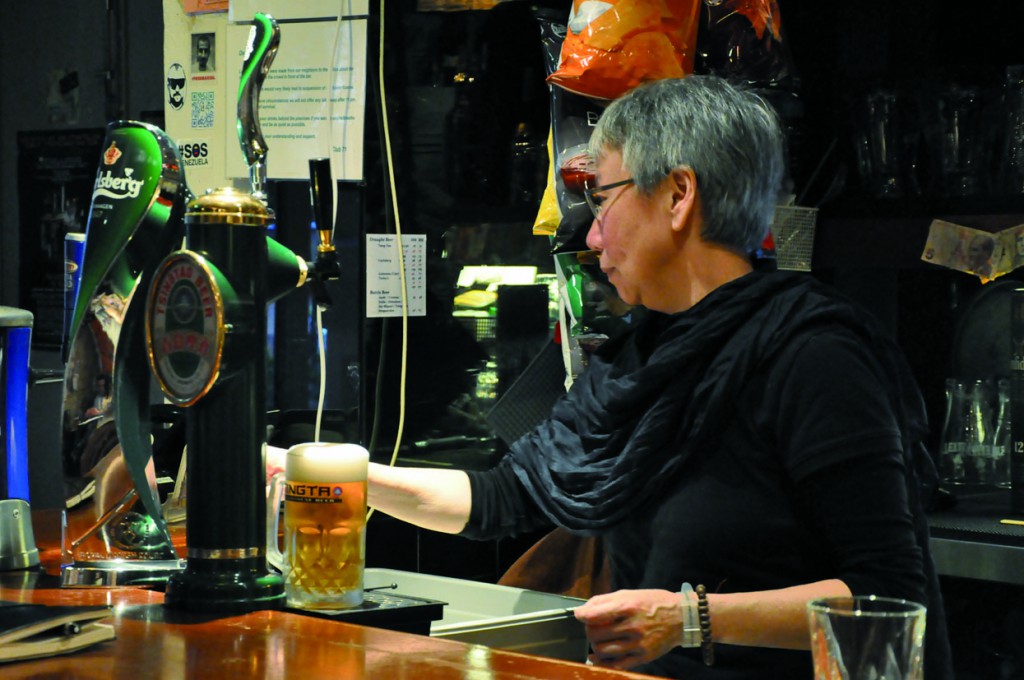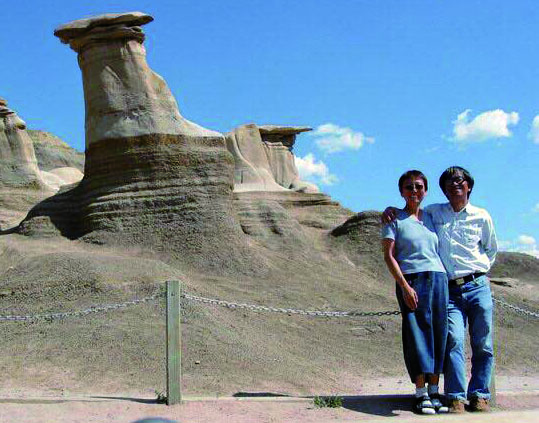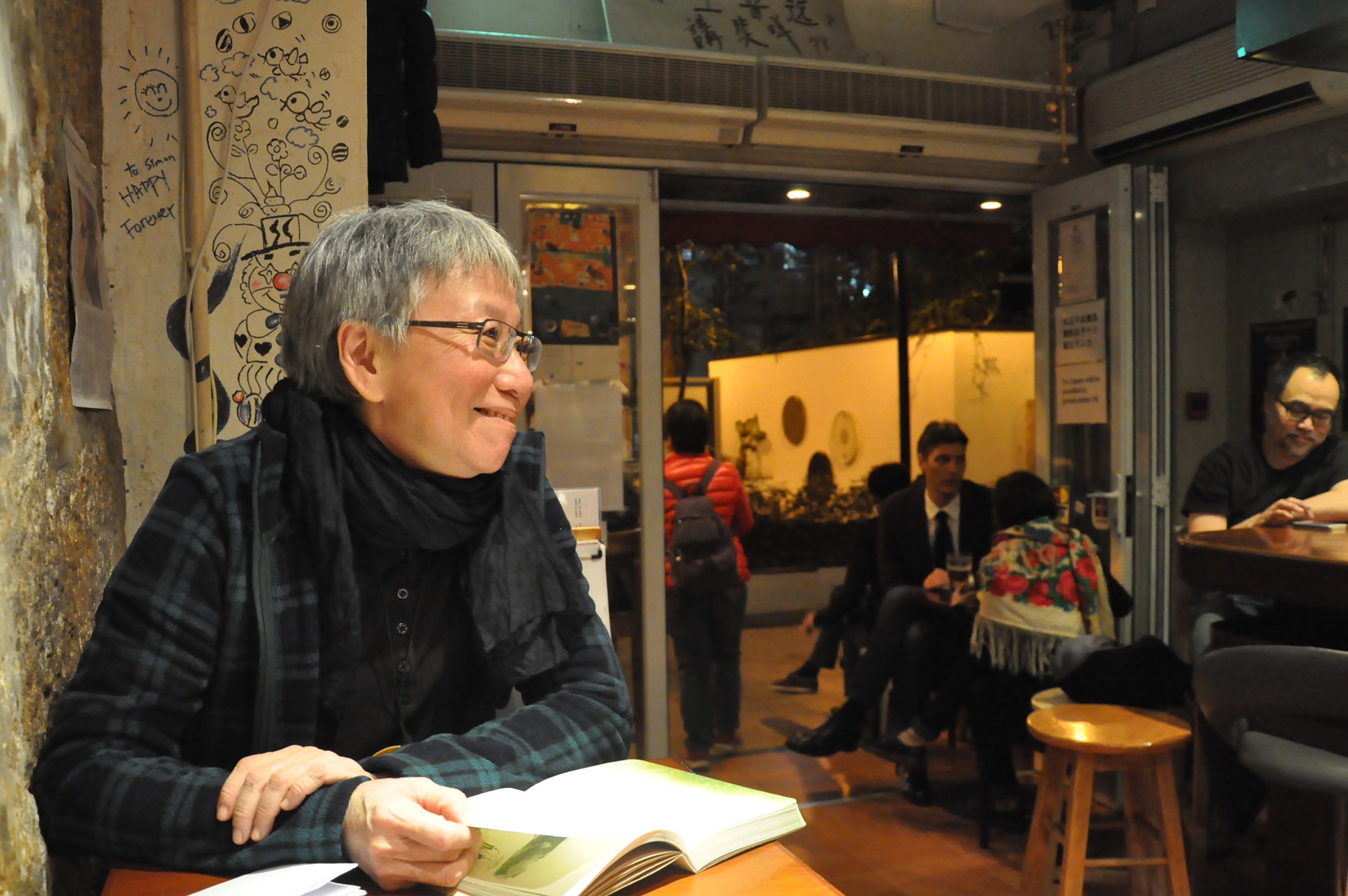Club 71’s Grace Ma Lai-wah refuses to call time on cultural hangout
By Vivienne Tsang
Tucked away in a non-descript alley in the trendy Soho district, Club 71 comes as something of a surprise. At the entrance, there are three ceramics of human heads by a local potter, Caroline Cheng, with the words ‘THERE’, ‘IS’ and ‘HOPE’ engraved on their foreheads. In the corner of the colourful painted interior of the bar, a musician is playing violin. Grace Ma Lai-wah, Club 71’s owner, extends Varsity a warm welcome.
The bar, named after the annual July 1 protests is the 61-year-old Ma’s second business venture. The first was the iconic Club 64 in Lan Kwai Fong which Ma ran for 14 years. Those were years that spanned the aftermath of the June 4 crackdown in 1989 to the 1997 handover, SARS and the 2003 July 1 protest against Article 23.
Throughout that time, Club 64 was a place where people from Hong Kong’s local culture, arts, social activist and media circles would gather to socialise, relax, talk politics and have a drink. Watching over the bar throughout those years was Ma.
Surprisingly, she says: “I’ve hated doing business my whole life, not to mention running a bar.”
Ma was enlisted to help by her former husband, a scriptwriter, who was one of the original 12 partners when the bar opened in 1990. Others included the late social activist Ng Chung-yin and media veteran Lung King-cheong.

Although she was still working as a secretary in a nursing unit at the time, Ma started working at the bar in the evening after work. “Men do the talking, and the women do the work,” she complains. She worked without pay for half a year before she began running the bar full-time.
Unlike the other bars and pubs in the area, the atmosphere in Club 64 is peaceful. No one plays hand games while drinking in the bar, instead they chat, read or play music. Ma says she did not deliberately create the vibe. “Perhaps it’s related to my personal character. I don’t like tumult,” she surmises.
The early days of Club 64 were tough for Ma. The business struggled to break even and her marriage broke down in 1993. She drank heavily.
There was also trouble with gang members who visited the bar and harassed Ma frequently. As she was new to bar business, she was at her wit’s end. One day, a gangster asked her for protection money. “I really had no money to pay him, so I told him, ‘I think no one can protect anyone’, she recalls. Eventually, she learnt how to deal with them and earned their respect. Over time, things became easier for Club 64 and for Ma.
For many of her customers, and even Ma herself, the name Club 64 conjures up memories of the Tiananmen crackdown in 1989, an event that had a great impact on her. During the pro-democracy protests, Ma joined rallies in support of the students in Beijing. Until the news broke of gunshots in the capital, she held on to the hope that China would change. The violent suppression left her shocked and speechless.
“It’s too much to handle, using a name like this for a bar or business.”

In fact, the name of the bar caused some unease when it first opened, just a year after the bloodshed. Some columnists even denounced the owners for profiting from death.
Yet, contrary to what many people believe, Club 64 was not named after the Tiananmen crackdown. Ma explains she was told the plan was to find eight shareholders who would each invest HK$80,000 to raise a total of HK$640,000. Another explanation was that the name derives from the Beatles song, When I’m Sixty-four.
It is no surprise that Ma supported the 1989 democracy movement. She has been concerned about society from a young age. When she was a secondary four student, she took part in a Hong Kong Federation of Students’ campaign to demand that Chinese be made an official language in Hong Kong.
“I was in primary three, and my mother asked me to read an English letter for her. How could I read it? It was a government letter,” she says, recalling an incident that made a deep impression on her. “We are Chinese people and we write Chinese. Why did we have a British government?” she asked herself at the time. Years later, this memory drove her to help distribute flyers and put up posters to support the campaign.
Besides joining campaigns and protests, Ma founded a monthly magazine, Suk Chin (《實踐》), with a former boyfriend in 1976, with the aim of improving the society and making Hong Kong a better place.
Whether defending Chinese sovereignty over the Diaoyu Islands, joining the Association for the Advancement of Feminism, objecting to the introduction of the national education curriculum or supporting the Umbrella Movement, Ma never tires of fighting.
“We need liberation in all sorts of things, people, whatever,” she says.
In the lead-up to Hong Kong’s handover to Chinese rule, Ma’s desire for freedom and the disillusionment brought about by the Tiananmen crackdown prompted her to think about the future. Like many Hongkongers at the time, her family applied to emigrate to Canada in 1990 for the sake of the children. “I agree very much with my former husband’s saying, ‘we don’t want to see them throwing stones in the future, and we don’t want to see them not throwing stones either.’”
Their application was approved in 1994, but by then she had divorced. She left Hong Kong and the business to move to Canada with her two young children, then aged six and eight. It was a challenge and Ma could not find a job that paid her enough to feed three mouths.
After struggling for a few months, she made the difficult decision to leave the children in the care of her mother and sister while she worked for their living. “Life must go on,” she says. Ma returned to Hong Kong and to running Club 64.

In 2004, the landlord of Club 64 decided to double the rent, a blow the business could not withstand. The bar was closed which turned out to be a blessing in disguise, as Ma’s current life-partner agreed to become her business partner in her next venture.
They chose the current address in Man Hing Lane, off Hollywood Road and signed a seven year contract for the space in 2005. At first, she wanted to name it “Retreat” in English, to convey the idea of a hideaway or sanctuary. But some misinterpreted it to mean giving up the fight. A regular customer who was also a friend suggested the name ‘71’, as a continuation of the spirit of “64” and, Club 71 was born.
Indeed Ma does have special feelings towards 71. On July 1, 2003, half a million people marched against proposed national security legislation under Article 23 of the Basic Law. On that day, she saw the unity of Hong Kong people. “It was the very first time in Hong Kong history, when people stood up and expressed themselves to criticise the government.”
The first two years of Club 71 were so tough that Ma became a frequent visitor to the doctor. Once the business was more stable, they could afford to hire staff. Ma says her partner has been a great support throughout. “He [her partner] helps and takes up a lot of my pressure,” she says.
However, Ma always believed in maintaining a friendly distance from her customers. At least she did until her partner suffered from a paralysing stroke in October, 2012. This coincided with the pressure of steep rent increases and complaints about noise from nearby residents. As a result of the complaints, the bar had to close earlier, leading to lost revenue.
Ma’s customers – that is to say, her friends – stepped in to turn Club 71 into a coffee shop during the daytime to recoup the lost business. “This is the very first time I can feel a close friendship,” she says with a broad smile.
Friends are also responsible for the décor at Club 71 which was designed and executed by three local artists named Choi Yee-yuen, Wong Yan-kwai and Guk Zak. Ma gets excited when talking about the unique design. She points at different elements, introducing them one by one.
Choi painted a cloudy blue sky on the ceiling where the Goddess of Democracy statue is camouflaged by billowing clouds. Wong created a colorful mural on the back interior wall while Guk offered a portrait, “The Height of Seventy-one”, that hangs beside it. Between the 19th-century brick side wall and these art pieces, there is a dialogue between history, art and democracy.
Club 64 and Club 71 have witnessed a quarter of century of Hong Kong history, from a British colony to a special administrative region of China. The city has had to face changes and upheavals, much like Ma. But, though it has never been a straight, smooth road, she has somehow managed to find a way to survive and to keep on fighting, showing perhaps that, “there is hope.”
Edited by Antonia Wong











































